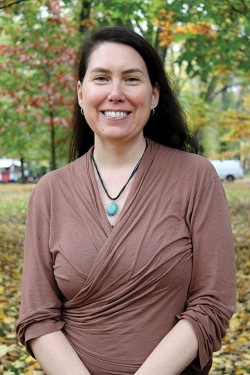This year, Jill Castek was hired by the Department of Applied Linguistics at Portland State. She is working as a research assistant professor within the Literacy, Language and Technology Research Group.
New faculty: Jill Castek
This year, Jill Castek was hired by the Department of Applied Linguistics at Portland State. She is working as a research assistant professor within the Literacy, Language and Technology Research Group.

Kayla Nguyen/VANGUARD STAFF
Jill castek was hired this year by the Department of Applied Linguistics.
The group works on several projects, but primarily provides opportunities for vulnerable populations of adults to acquire digital literacy skills.
“It’s a very important component of the 21st century to have digital literacy skills,” Castek said. “And although young people and college students and those in the work force have adequate opportunities to develop those skills, there [are] a lot of people in our society who have been left behind.”
Recent immigrants, ex-convicts and the poor lack access to training, limiting their ability to participate in society, she said.
The group develops online training materials to deliver necessary skills to disadvantaged groups.
“It’s a high-need area when it comes to equity and access,” Castek said. “So it very much has a social justice component to it.”
The group goes into target communities in the Portland area to make this education available; similar groups are working at six other sites in five states.
Castek is also working on her own research.
“A lot of my work primarily was focused on teaching and learning among populations of adolescents in upper-elementary and middle school,” Castek said.
She’s in the process of writing a grant proposal to fund a look at the development of scientific language in an informal science education setting, using tablet technologies to support online and face-to-face discourse.
“When we look at today’s society and the dependence on…technology, we really need to work hard, across the board in all educational areas, to help support learners in general in acquiring the skills and strategies needed to be part of a 21st-century society,” Castek said.
In education today, there is a very traditional way of doing things, with textbooks and paper and pencils, but when people are sent into the workforce they need to be digitally able, she said.
“There are multiple dimensions of literacy practices that intersect with the digital world that we live in, and to support that kind of development is really where the next level of education needs to go,” Castek said.







